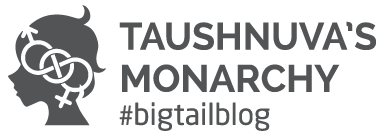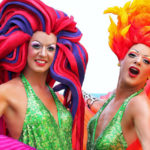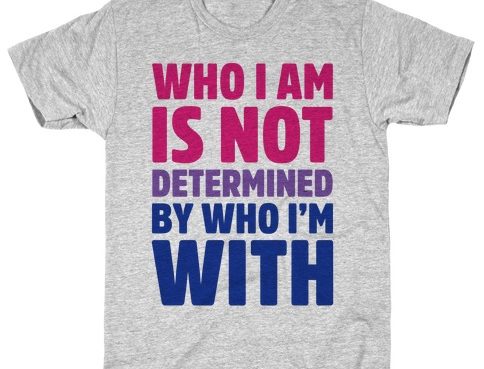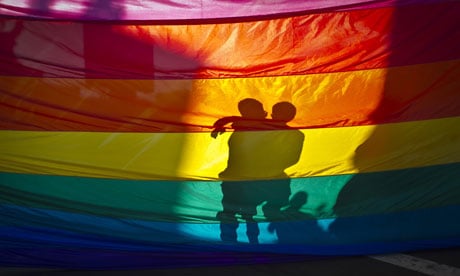Some of us are attracted to people regardless of gender. Bisexual people can be found in all walks of society, and everywhere in the world. A lot of myths and misconceptions surround it though. Read on for some debunking!
We call this our “Bisexuality FAQ”, but you may notice there’s not many questions on it. In truth the most commonly asked questions are “Are you sure?” and “Am I?” – but the answers to those are quite short – yes and you tell me.
It’s also true that a lot of the list that follows is “Bisexuals aren’t…” and some people have asked us “why can’t you be more positive and say all the nice things that bisexuals are?”. That’s difficult – when people repeat the myth “Bisexuals are Indecisive” they mean “Bisexuals are more indecisive than other people”. We could counter that by saying “Bisexuals are decisive”, but we don’t think that we’re more decisive than everyone else. After all, everyone uses the word ‘tall’ when they list their height (4ft 11in tall, for example), but only people taller than average get described as “being tall”.
We think bisexuals are just as decisive, confused, honest, red-haired, tall or fat as everyone else – but the only clear shorthand for “Bisexuals are Just As Decisive As Everyone Else” is “Bisexuals Aren’t Indecisive”. So, read on!
Bisexuality confuses me so bisexuals must be confused
Why would we be? Some bisexuals are confused about bisexuality but far more people who aren’t bi have confusing beliefs about bisexuality. Here at the Bisexual Index, we believe that a bisexual is someone who is attracted to more than one gender.
Everyone accepts that it’s possible for a person to be attracted to people of more than one height, weight, hair colour, or race. For bisexuals that openness also includes gender.
If you’re wondering if you are bisexual, take our bisexuality test!
Bisexuals are just greedy
What is greed? It’s not ‘greed’ if someone likes chocolate cake and fruit salad. Greed isn’t a wide range of desire or attraction; it’s excessive attraction. Some people seem to confuse being attracted to more than one gender with being attracted to everyone. We think this is rather silly – it’s a bit like saying that lesbians or straight men are attracted to all women, or straight women and gay men are attracted to all men.
Bisexuality isn’t about ‘all’ it’s about ‘any’.
Bisexuality is being equally attracted to men and women
You don’t have to be equally attracted to red-heads and brunettes to be attracted to both, and preferring lettuce to liver doesn’t make you a vegetarian, so why do some people insist that “true” bisexuals are exactly and equally attracted to men and women? We suspect it’s to keep the numbers of bisexuals down, or to excuse themselves from identifying as bi.
Some bisexuals prefer androgynous partners, some don’t. Some really love the differences between the sexes, others don’t see those differences. Some of us are only attracted to 5% of one gender, and 60% of the other – you don’t need to be 50/50 or have those add up to 100. And some bisexuals believe that thinking in terms of two genders is restrictive.
The Kinsey Scale rates people’s experiences from heterosexual to homosexual and has in the middle “equally heterosexual and homosexual”, and sadly a lot of people have heard that bisexuality is the middle of the scale, when in fact the scale doesn’t mention ‘bi’ at all. We prefer to think of bisexuality as being like the English Channel, you get wet as soon as you start swimming from Dover and can’t dry off until Calais, no matter how deep it is beneath you! For further explanation of the Kinsey Scale see our Bisexual Scales page.
Sexuality isn’t black and white – and the spectrum between gay and straight isn’t greys. Think about it this way – rather than black and white, sexuality is red and blue. Purple is not the new red-blue, purple is the new purple. And there’s more colours besides that between red and blue, there’s orange, yellow and green for starters!
Bi means two so bisexuality is transphobic
Some people get hung up on the ‘bi’ and protest that gender isn’t binary. They claim that identifying as bisexual is tantamount to saying trans* people don’t exist, or that you’re not attracted to them, or that you’re only into masculine men and feminine women. However many people using the identity “bisexual” disagree.
In traditional dictionaries:
- Homosexual is defined as “only attracted to the same sex”
- Heterosexual is defined as “only attracted to the opposite sex”
So why then dismiss bisexuality as being about “only men and women” when the definitions of hetero- and homo- don’t mention those? And why don’t the critics of the word also have a go at people using “heterosexual” or “homosexual” on the grounds of the words being even more restricted?
In this modern age with a wider understanding of gender some people choose to re-state those as:
- Homosexual- “attracted to people of a broadly similar gender”
- Heterosexual – “attracted to people of a broadly different gender”
In fact many people say there’s more than two genders, but if two options are either “similar to me” or “different to me” then we think it’s clear that “both” can refer to those two options rather than two perceived sexes.
So why not have that as our “please adopt this definition” definition? Well, if there’s more than two genders and some people are no gender, or multiple then it’s entirely possible to be attracted to more than one gender that isn’t like your own, and not fancy your own at all. Attraction to more than one gender doesn’t mean there’s one that you have to fancy or else. So we prefer the simplicity and inclusion of ‘more than one’.
In other words: bisexuality isn’t an attempt to pigeonhole gender, it’s the freedom to feel attraction without blinkers! But we agree that ‘both’ is an oddly limiting word for the category of “everyone else” – this is why we say “more than one gender” at the Bisexual Index. Ultimately though, we don’t think anyone is obliged to use the word “bisexual”, and we agree there’s some way to go before our definition is the most common one.
Bisexuals aren’t Queer
Some of us are, but no – individual bisexual people needn’t be ‘queers’. The gay and lesbian scene is full of bisexuals, many of whom know it’d be socially awkward to come out about their true sexuality in a biphobic atmosphere. We’re together in our attraction to people of the same (or similar, see above!) genders, and in the discrimination we face for being “them” from the homophobes. For decades we’ve marched on Gay Pride, worked in gay bars, and we’ve been queer bashed for not being straight. Our sexuality needs to be recognised as part of the Queer movement, and we should be welcomed as part of the struggle for acceptance and tolerance.
Some bisexual people use queer as an identity, some don’t. Queer doesn’t mean ‘bisexual’.
Bisexuals are the targets of biphobia, and homophobia too.
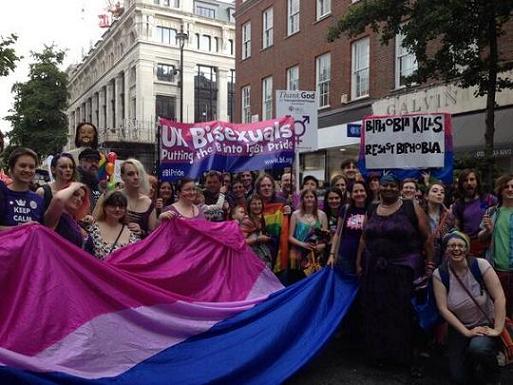
LGBT Prides include many bisexuals
LGB & T are not rigid sided boxes to stuff queers into, they’re circles of overlapping light, they’re a Venn diagram.
But do we think bisexuals have to identify as queer? No, of course not – we don’t even think they need to identify as “bisexual”! We do think though that no-one should be telling you that you can’t be a part of the queer community because you’re bisexual. How you define is up to you, not us and not them.
Why do we need a Bi Community?
One of the frequently asked questions by people outside of minorities is “If you really are just like us, why do you need to get together like this? We don’t!”
It can seem strange that people with no common bond other than their sexuality would want to form a social group. Surely we’d all be different in politics, economic background, views and opinions? Yes, if this was a truly random sample of bisexuals…
Do the people at a bisexual coffee morning really have nothing in common other than their sexuality? Of course not! They probably all live near the venue, like coffee, find the time and date convenient and want to meet people & chat in a venue that’s not a bar. Why then make it a bi coffee morning – if we can do all that at any coffee shop?
So that in one regard we can all be on the same (broad) page.
In the pub, at work, at home, we spend a lot of our time wondering what will happen when/if we disclose our bisexuality. Will it change our friendships, will it affect our working relationships, will it be a shock to our family? By coming together as bisexuals (who are also interested in coffee, or union activities, or badminton, or dogs, or indeed ‘Orange is the new Black’) we know that when the conversation turns to how we’re doing in our personal lives it won’t be stopped dead by the “revelation” that we’re simply attracted to more than one gender.
The bisexual community isn’t about bisexuality in isolation – it’s about bisexuals coming together to celebrate and understand all the things they have in common, with others who understand what it is like to be bi.
Bisexuals can’t be faithful
Some people ask “How can someone attracted to more than one gender be faithful to a partner of one gender?” Quite easily! Being attracted to people isn’t cheating, did you know? Some people are attracted to more than one gender, some people to more than one skin colour, or height, or body shape, or age group, or background.
Would a straight man attracted to both tall and short women be unable to remain faithful to a tall girlfriend? Would a lesbian woman attracted to both musicians and engineers be unable to commit to a guitarist?
And anyway – what is “cheating”? Relationships aren’t a sport and being a partner to someone who is monogamous with you doesn’t make you a “winner”. Perhaps there is a different conversation to be had about people choosing how they respect others. Maybe we’ll put a page up about that some time.
Bisexuals have to date both men and women
It’s compulsory is it, dating? Some of us are in happy relationships with one partner, others have multiple relationships, or are polyamorous, and some swap to dating the other sex whenever their current fling ends. Some bisexuals are happily married and raising children. Some bisexuals are single, some are celibate. You do not need to have ever have had sex to be bisexual. Some bisexuals enjoy casual sex, others don’t’ have sex outside committed relationships.
Some bisexuals do date more than one partner at a time, and some of those are “men and women”, but being bisexual doesn’t mean you are obliged to do that.
Bisexuality isn’t about who you have sex with, or who you’re in a relationship with. It’s just about you – and the genders you are attracted to.
Bisexuals always alternate between the genders
There’s an often repeated myth that “bisexuals leave you for someone of the opposite sex (to you)” – on the gay scene a bisexual man is always pre-condemned ready for when he leaves his boyfriend for a woman, and on the straight scene he’s going to dump his girlfriend for a man. But this has come about, we suggest, from the way people notice differences.
When you’ve split up with someone, and then found a new partner – has the decision been based purely on how they differed from your last partner? Or on what you had in common with the new partner? We’d bet that while it might be a mixture, it’s far more about the new love and what you share than your old love and how they differ.
We think that the “bisexuals leave you for someone of the opposite sex (to you)” stereotype has come about from people simply looking for ‘reasons’ in the differences between them and their ex’s new lover. Sure, they might also be different to you in a lot of other ways, but to you the different gender seems like a big and significant difference. But it might not have been to your ex! It’s easy to notice this from a distance as a difference and then make it a stereotype because it’s not a difference between partners a gay or straight person will often have.
Sometimes a bisexual person’s new partner will be of another gender to their last, sometimes the same.
Of course, if that poor bisexual guy we mentioned earlier next dated another man, and didn’t flip-flop to a relationship with a woman, then it’s probably still okay for the biphobes – he’s still showing a lack of commitment (regardless of the actual reason the relationship ended) and that’s a bi stereotype too! Sometimes it seems we just can’t seem to win, eh?
Bisexuality is an ‘easy option’
Some people think that bisexuals are just gay and lesbian people who don’t want to come out as gay or lesbian, as if saying you were bisexual would allow you to sidestep the prejudices and discrimination we face. It’s not an easier option.
Stonewall’s Workplace Equality Index questionnaire in 2009 confirmed this was not true – it found that lesbian and gay employees felt much more comfortable being out at work than bisexual employees. When they were commissioned to research the experience of bi employees by the UK Government, they found that those bi employees (of “Diversity Champions“) didn’t feel comfortable being out enough to even speak to their researchers. Their surveys showed that 4% of these employers’ workforces identified as bisexual but nationwide focus groups netted only 30 people willing to attend.
Bisexuality is all about being “fluid”
Often you’ll hear long winded definitions of bisexuality include the word ‘fluid’, or ‘changeable’. Some bisexuals like the word, because it feels to them like their sexuality does change over time. One day you might be only fancying long haired people, the next week all your fantasies might be about office workers, or pizza-delivery-people. Or you might not – some people have a type and stick to it. That’s fine with us. But why do people who aren’t bisexual like the word?
Because it explains away the gender attraction – they can’t get their head around people liking more than one gender, so they couch it in terms of the attraction changing, flowing, from same-sex to opposite sex and back again. When non-bisexuals define bisexuality as “fluid” what they usually mean is “no-one can be genuinely attracted to more than one gender at the same time, so it must be about being gay some days and straight others”.
Of course, some people who do have changing attraction patterns may well find themselves fancying men more on Saturdays at 6.30pm but that doesn’t mean all bisexuals swing from gay to straight. Bisexuality isn’t inherently fluid – it’s just attraction to more than one gender.
Bisexuality is just a phase
We disagree with “it’s just a phase”. A lot! So much so that we’ve needed to make a separate page just for that, and it’s still expanding.
It’s okay to spell it Bi-sexuality isn’t it?
Bisexuality is not a combination of heterosexuality and homosexuality. We’re not half formed or half committed. We’re whole.
We are not bi-sexual, or bi sexual or BiSexual we’re bisexual! The word is in the dictionary – it’s not two words put together. Pretending the word “bisexual” doesn’t exist is a tiny, trivial way of denying our legitimacy, but it still is one. After all, if what we have is two sexualities then maybe we should pick one and stick with it?
But in reality there’s no indecision, no uncertainty, no halves. And what’s more, bisexuality isn’t a bridge between Gay and Straight. So, perhaps there’s no need for hyphens. Incidentally, even people who write “bi-sexuals” don’t use “bi-sexuality”. Time for some consistency, perhaps?
Have you ever met a bisexual who prefers to be a bi-sexual? That hyphen makes the stress longer, the pause audible. It’s a chance to dwell on the syllable “sex” straight after. But it’s not all about sex, and we don’t have two competing natures.
“Barsexuals” are just teasing, not like proper Bisexuals
Some people think that it’s terrible that others are more prone to show affection after drinking. Apparently they have come up with a new word “barsexual” for women who’ll flirt with other women when they’re drunk. The objection is that they’re either giving bisexuals a bad name as ‘experimenters’ or else playing into the idea that we’re all straight really. Barsexuals certainly not “real bisexuals”, we’re told – but here at the Bisexual Index we disagree!
They might be, it’s up to them.
We think that attraction is the key to bisexuality, not the relationships, or the sex, or the lifestyle. We’re also well aware that some people find it easier to show their attraction after a few pints, but we don’t think that alcohol changes sexuality, just lowers inhibitions.
Yes, some people aren’t interested in sex, or relationships, with more than one gender – just flirting and kissing. But the amount of attraction isn’t relevant for bisexuality – just its existence.
The same thing goes for straight and gay: if you were attracted to only the opposite sex, but just wanted to kiss, cuddle and flirt with them, then don’t you agree you’d still have every right to call yourself ‘straight’ if you wanted to? We think that the same thing holds true for gay people, and so it must hold true for bisexual folk too, regardless of the amount of attraction they feel towards other genders.
Just as you can be bisexual without having yet slept with more than one gender, so you can be bisexual without wanting to do so either. It’s not about the sex. Ultimately it’s up to people to label themselves, so we think that “barsexuals” who use the word “bisexual” about themselves have every right to do so, and bisexuals who feel the b-word needs to be protected from fuzzy edges should go and calm down. Sexuality is all about those fuzzy edges!
Words like barsexual and bicurious are used as slurs to denigrate people and set up “good bis” vs “bad bis”. Please don’t join in.
Bisexuals are plague dogs
The early warnings about HIV and AIDS targeted us as a ‘high risk group’, when the real risk is not about who you are, it’s about what you do. Bisexuals have taken this personally and have taken the lead in educating about safer sex.
The blunt truth is this:
- Bisexuals don’t spread HIV
- Sex with Bisexuals doesn’t spread HIV
- Bisexuals are not “the bridge” for HIV infection between gay and straight people.
- Unsafe sex and sharing needles spreads HIV, regardless of sexuality
It’s not who or what you are, it’s what you do.
My Partner Is Bisexual, What Should I Do?
It can be a bit of a surprise when someone you love tells you something that you hadn’t realised. It doesn’t matter if that ‘something’ is “I’m adopted!”, or “I’ve won the lottery!” or “I’ve just lost the car on a game of online poker!”. Some news is good news, some news is bad news, and some news it just news.
On hearing their partner is bi, some people wonder if this means they’ll be unfaithful, or leave them for someone of a different gender, or if this means they’ve already been sleeping around during the relationship.
But being bisexual doesn’t mean these things – just as being attracted to a range of hair colours, or ages, doesn’t mean that either. You’re the one they’re with, you!
If the prompt that made your partner tell you was a simple desire to be more truthful, that’s great. Kind of like telling you they’re really adopted just after you met their parents. Try to treat it like that, and not like they lost the car.
It’s not the lottery either – rather than think “Are there some good things about having a bisexual partner?” may be you could try wondering “Are there some good things about having a partner who loves me so much they’ll be honest to me?”
But if they’re telling you the reason they’re being unfaithful (for example) is because actually they’re bisexual, then feel free to wag a finger at them for us. Being bi doesn’t make people unfaithful to their partners. Deciding to be unfaithful does that fine on its own.
Everyone is Bisexual really
The often quoted “Everyone is bisexual really” is utter rubbish! When people say this they hardly ever include themselves for starters. It’s a phrase people use to dismiss bisexuality – after all, if we were the majority we needn’t kick up a fuss.
When people use it they seem to mean “potentially” and talk about how we’re born bisexual. This is either not true, or not useful. We’re tired of trying to decide which.
It’s about as useful as saying “Everyone’s mixed-race really” when talking about ethnicity – it’s not accurate in any real sense and doesn’t provide any useful answers or usable insight when trying to combat racism or privilege.
Some people are attracted to only one gender. Some people are attracted to more than one gender. These two statements are not incompatible, and don’t overlap.
What bisexuals?
When it comes to bisexual visibility, some people say they’ve never seen, met or heard of any bisexuals. When they’re told the person they’re talking to is bisexual, they scoff. “Oh, you’re bi, sure. You’ll grow out of it. Everyone does! No-one’s bisexual for life.”. We disagree, and hope you’ll find plenty of answers on this website to give these sort of people, if you do encounter this.
There are millions of us. Recent surveys suggest as many as 1 in 20 people are actually bisexual.
Bisexuals are actually safe, normal and boring. Just like you
There’s a risk when we talk about stereotypes. Saying “No, we’re not” can lead to “None of us are” and from there it’s an all too easy step to “If I do fit the stereotype then I won’t be welcome”.
So, for the record – some bisexuals are greedy. Many of us have been confused. Lots of bisexuals enjoy group sex, casual sex and kinky sex. Some of us are trans, some have huge beards, some can’t hold down a proper job. Some of us have sex on the gay scene and then sneak back to our wives. Some of us are ‘cheats’, whatever that is supposed to mean.
It’s not the bisexuality that makes us this way. People are just different, varied, diverse.
Being attracted to more than one gender makes us different – we make society more diverse. Diversity should be celebrated.

